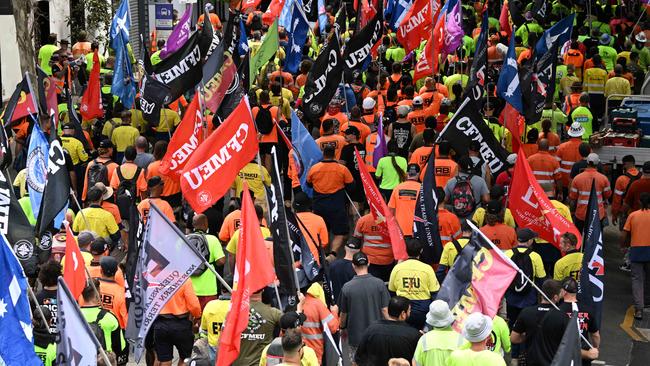
It was the most obvious of ruses, the worst kept secret in Queensland.
The group of tattooed and masked heavies manning a months-long, 24-hour blockade of a non-unionised building site in Brisbane’s West End were not, as they claimed, just a bunch of concerned local greenies banding together to protest against more development in their suburb.
They were enforcers flown in from interstate by the nation’s most militant union - the CFMEU.
This truth was exposed by the fact these ‘greenies’ maintained their blockade until the very day the besieged developer - Pradella - agreed to dump its refusal to use a unionised crane driver on the site.
If there had been any skerrick of doubt beforehand, their motivation was suddenly clear to all.
All, that is, except Mick de Brenni, the state government minister responsible for regulating the construction industry.
He sensationally suggested that those behind the delays were in fact “Greens political party interfering”.
“They have got form in this space; they should get out of the way,” he said.
For Queenslanders it proved the clearest example of the state government’s relationship with unions and reluctance to call out blatant intimidatory behaviour.
West End, however, was a minute in a decade of mounting strength and confidence for the Queensland CFMEU construction division that has now resulted in Commonwealth intervention and an administrator appointed.
A months-long investigation by The Courier-Mail has exposed how the CFMEU has built its power in Queensland to now effectively write government policy, add billions of taxpayer dollars to major projects and freely abuse rivals who don’t comply with its demands.
DANGER MONEY
“I hope you’ve got security.” That was the response one high-ranking contractor gave this masthead as we revealed a deep dive into the practices of the CFMEU.
“You’ll never get me on the record,” another declared.
“I know too many stories, too many threats.”
The common feeling from more than a dozen workers, subcontractors and business owners was simple: Fear.
They, in their own words but sharing the same theme, said speaking out against the CFMEU would put them in a world of pain.
The game is simple; submit to CFMEU demands and life’s easy.
One worker who broke the unwritten rule and crossed a picket line at Cross River Rail this week said they were emphatically told they wouldn’t work on another government project again.
There were fears scenes of an all-out brawl - like the one at Dutton Park in May - would repeat.
Videos seen by The Courier-Mail reveal white-hot tension between masked CFMEU members and workers attempting to get access to the Dutton Park site.
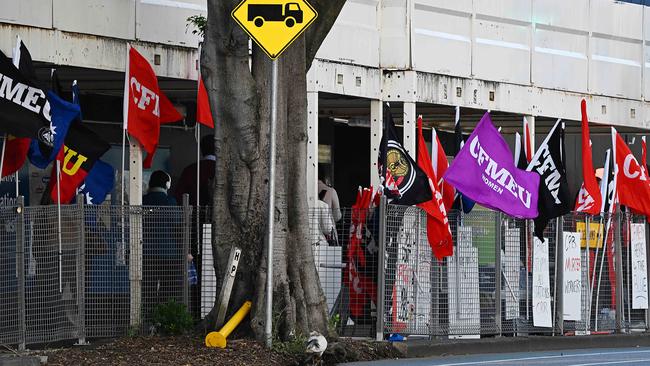
Unaligned workers confront masked CFMEU members - whose protected stop-work action allows them to walk off the job.
Others not covered by the action attempt to access the site to get paid and a scuffle ensues.
“Don’t cross a f**king picket line lads … what type of f**king union man crosses a f**king picket line,” one CFMEU man yells.
“You think in Australia youse c*nts would f**king know better.”
Soon, the CFMEU locks arms as workers attempt to charge through and get on the job.
A site fence is torn down to get access and punches are thrown between a shirtless worker and CFMEU enforcers.
Other CCTV obtained by this masthead reveals men arriving at construction sites in the early hours of the morning to padlock gates.
They’re not branded CFMEU, but again industry insiders say there’s no doubt.
“The unions are a huge part of the cause of this, but people don’t want to take them on. People have families. People have businesses to protect. People are scared,” a sub-contractor said.
The “this” that last source was referring to is Brisbane’s spiralling housing crisis - and the role the CFMEU and, they say, a complicit government has played in driving up the cost of building or buying a home.
To most Queenslanders the recognition of the CFMEU goes no deeper than noticing their flags fluttering high over major construction sites.
But those flags have more of an effect on Queenslanders’ lives than most realise.
“Everyone’s talking about this but no one wants to say it publicly for fear of retribution,” the boss of the Real Estate Institute of Queensland Antonio Mercorella says.
“The statistic I get quoted frequently by people in the know is we’re 30 per cent more expensive (than other states) and that’s largely because of unions like the CFMEU.
“We need to start having a conversation about the impact that unions are having in Queensland … if we’re going to get serious about addressing homelessness.”
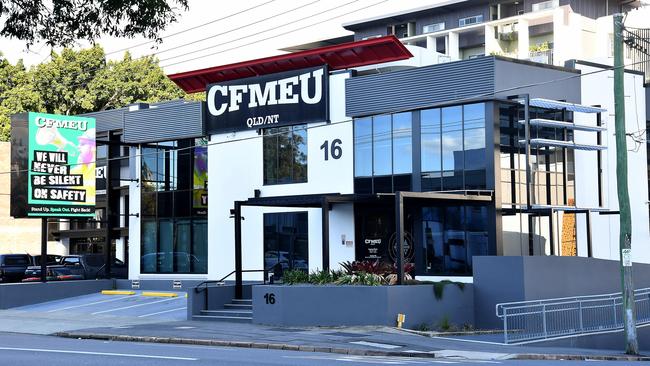
There is no denying the campaign has been a startling success for the CFMEU’s members.
Their wages have surged - by as much as 45 per cent in recent years - while the days they are expected to be on site have plummeted to the worst in the nation.
It has been, on that measure, a great outcome for workers - the primary objective of any trade union.
How have wages been able to rise some seven times the rate of a nurse, police officer or teacher?
SPARK IN A TINDERBOX
The secret deal struck to elevate Steven Miles to become premier of Queensland lit the fuse on a simmering union war that has descended into threats and violence.
Once the most vocal, aggressive and unchallenged union in the state, the CFMEU faces a battle to maintain influence within the corridors of power as the United Worker’s Union takes power within Labor and polling points to an LNP government in October.
The CFMEU didn’t back Mr Miles to be premier and it holds a strong disdain for now Deputy Premier Cameron Dick - the most senior politician aligned to the Australian Worker’s Union.
In mid-December Health Minister Shannon Fentiman realised, while she was within a handful of votes of becoming Queensland’s 40th premier, it wouldn’t be.
Ms Fentiman had announced her candidacy to become premier, declaring she was “best placed to lead” the party to the next election.
Ultimately, the challenge would last mere hours, with Mr Dick’s AWU and Mr Miles’s UWU striking a deal to make the latter premier.
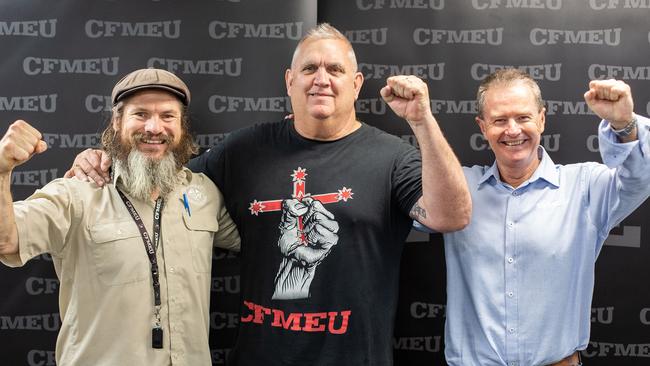
Ms Fentiman, a former industrial officer for the Australian Manufacturing Workers’ Union, once had the support of the CFMEU - but said those days were done.
After winning her seat in 2015 Ms Fentiman addressed a meeting of CFMEU officials and delegates to thank them for their “hard work” in the campaign.
It came with a reminder to “never forget your roots, Shannon”.
The details of the deal - to make Mr Miles premier and the right-aligned Mr Dick the deputy - have not been made public.
Privately, the CFMEU is claiming both Mr Miles and Mr Dick struck a “dirty deal” and attacked workers’ wages and conditions.
“Blue collar unions have the shits with it,” one CFMEU member said.
The CFMEU has for decades been Queensland’s loudest union, with aggressive protests and standover tactics on worksites helping it achieve favourable outcomes.
It’s now preparing a concerted campaign against the AWU, UWU and by default, the state government which could change Queensland history.
IF THE CFMEU WINS, IT’S OVER
In August, AWU Queensland branch secretary Stacey Schinnerl warned Mr de Brenni about fears a brewing turf war between the major unions was leading to the government being fed misinformation about the role of the CFMEU.
In an email seen by The Courier-Mail, Ms Schinnerl writes: “I cannot understate the potential (the correspondence) has to undermine any positive relationship the AWU may have with your department if immediate steps are not taken to address the misinformation”.
AWU officials have allegedly been followed by known CFMEU organisers to their homes, while branded cars have been covered with stickers.
The Queensland’s government’s multi-billion dollar Cross River Rail has become the flashpoint for the feud, with videos show CFMEU organisers attempting to gain access to the inner-city sites to investigate alleged “safety breaches”, and plastering stickers saying “AWU-Australia’s Weakest (or Worst) Union” and “AWU - Always Was Useless”.
At the $300m Centenary Bridge project CFMEU members radio ahead about the impending arrival of AWU officials for a routine visit.
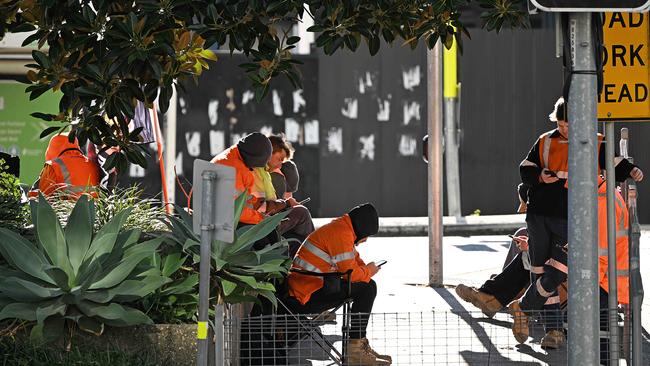
Soon, their vehicles are surrounded as militant members - some from the notorious CFMEU youth crew - shout and bang on the car windows.
It’s one skirmish in a wider war between the unions for control on Queensland’s major construction sites.
Frustrated major contractors argue the CFMEU uses tactics of intimidation and strike threats to force them to agree to significant pay increases and improved conditions for workers.
They’re emboldened, the contractor said, by the government’s Best Practice Industry Conditions policy.
“The government is forcing contractors to the table with the CFMEU,” they said.
“This isn’t about union bashing - we’ve worked with the AWU for decades without major issues.
“But by the state government honouring a deal they’ve struck with the CFMEU for some silence they’re creating problems for the sector, for the taxpayer, playing in a space they shouldn’t be and effectively gearing the CFMEU to take over the civil sector. This is going to kill off the private sector.”
Another construction contractor said: “we’re caught in the middle of this war- and this is being aided and abetted by the state government.”
One CFMEU organiser allegedly told a civil subcontractor the union planned to “to f**k the civil industry up - if people don’t sign with us we will f**k them to the ground”.
“The CFMEU wants to take over the civil construction space - they want total control and they’re directing ministers to write the policy to do this,” the sub-contractor said.
The state government denies it’s being influenced by the union war and said its only focus was on delivering fair wages and safe workplaces.
Earlier this year organisers from Victoria hit the ground in Queensland, attempting to gain control of sites in the same way as has been down south.
Insiders say Queensland CFMEU construction boss Michael Ravbar was emboldened by the strides the Victorian branch of the CFMEU took in their power play and he was keen to seize sites currently under the control of Labor’s right-aligned Australian Workers’ Union.
Mr Ravbar has privately, and repeatedly, argued the AWU has been “losing power for some time”.
“This is going to get very ugly,” another insider said.
THE BEST CONDITIONS
The CFMEU had friends at the highest levels of the nine-year Palaszczuk and Miles Labor governments.
Usually, unreasonable union demands were offset by the market - which sets the price of labour.
Enter Public Works Minister Mr de Brenni - himself a former union official - and his controversial Best Practice Industry Conditions policy.
That policy gives CFMEU workers on state government projects worth more than $100m a range of far better conditions than the market would otherwise ever offer - including 30 per cent higher salaries.
The result is a government-created “high floor” for construction rates in the market - dubbed a “CFMEU tax” that all construction companies competing for labour must now match.
“You cannot limit (the BPIC) effect to only projects over $100m,” one industry insider said.
“You’ve redirected the market to have to compete with those forces to attract labour – so the state government has moved the whole industry.
“They’ve trampled the award. You cannot blame any worker for leaving a council job or another job to earn twice as much on a BPIC job.
“It’s creating this butterfly effect with enormous implications. The idea that you can keep it isolated to only major projects is absolute bullshit.
“You’ve set that as your new employment arrangement - you can’t chop and change rates of pay, it’s f**ked the whole industry and the state government is doing the bidding of the union.
“Frankly, it’s disgusting.”
State government ministers, from the most junior to Premier Steven Miles, maintain their innocence.
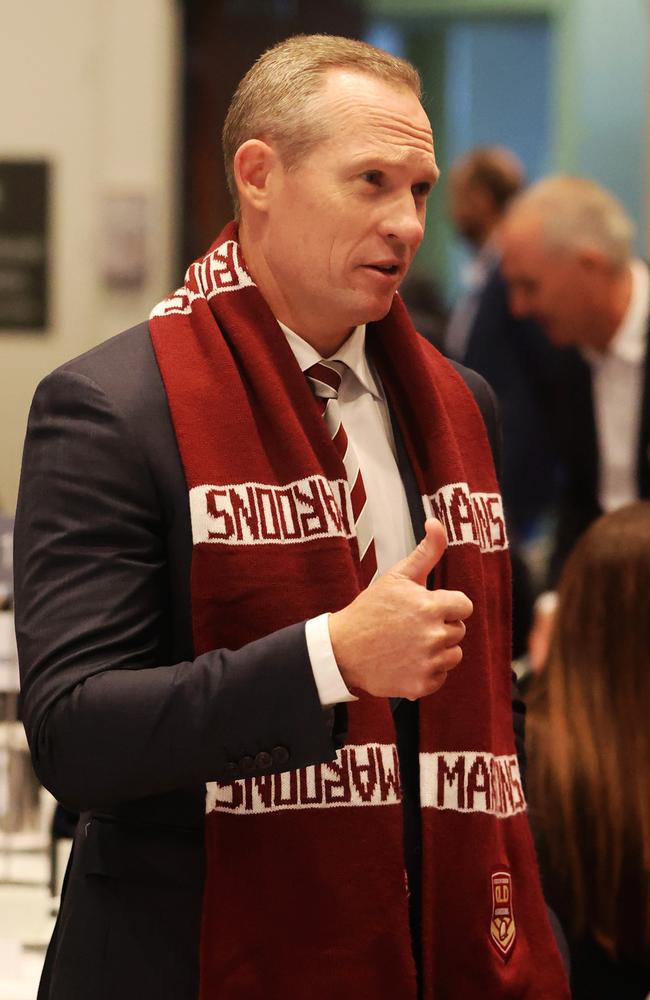
When stakeholder concerns about BPIC giving the CFMEU confidence to threaten workers, Mr Miles this week said he does “not accept the premise” of that.
He said companies needed to be held to account.
“Every time an industry figure has raised with me concerns between the link between that union’s behaviour and BPICs I’ve sought to discuss that with them and it has always come down to their industrial relations practices, their behaviour in the workplace,” Mr Miles said.
“We don’t want to see companies using government projects to bargain down wages, but this is an entirely different matter. This relates to industrial relations practices and workplace behaviour, which are largely regulated by the Australian Government.”
Another industry insider said the government was “ignorant as to their role” in meddling with company-union negotiations.
“They are playing in a space where they’ve never played, and they’re creating problems for the industry, and the taxpayer,” they said.
“Our state government is being coerced, if not cajoled, into taking actions and operating in spaces where they legitimately shouldn’t be.
“This is about honouring a deal they struck with the CFMEU, and there are significant cost outcomes that are a direct product of this state government policy being in place.”
More concerning, the private business owners argue, is BPIC widening the gap between wage and productivity growth.
As a result, taxpayers are being slugged more for major projects as the construction industry delivers less, for more money, over longer time periods - while removing the workable nexus between employees, employers and their representatives.
The wage surge combined with the slashed productivity means developers say they are choosing to sit out all together, or risk collapsing.
Those managing to keep afloat are now forced to sell the properties they have built at sky-high prices to not lose money - in turn driving up property prices broadly.
“Those wages are now embedded in the market, they’re not going away and I don’t see how it (the housing crisis) can get better given the labour pool,” one said.
The government’s hand in crippling the market and capitulation is a sore point in the industry - claiming it is now non-competitive, and forcing local contractors out of the running.
On multiple occasions, Mr de Brenni has defended BPICs, and denied they were driving up the cost of taxpayer-funded projects.
TURNING A BLIND EYE
The CFMEU often chooses to wield its power through a public show of force - but one quiet protest in July 2023 unsettled the hardest industry figures.
For four months developer Pradella’s inner-Brisbane construction site transformed into a flashpoint of threats, standover tactics and relentless intimidation – with the state government happy to turn a blind eye.
Beginning in April, dozens of masked men took shifts on a large blockade in West End, where Pradella was attempting to build a luxury high-rise apartment building known as The Lanes.
Residents were intimidated and the mum and dad investors in The Lanes were being held to ransom.
Special duty police were employed as the men maintained an around-the-clock presence opposite the multi-tower project on Ferry Rd.
Masquerading as “Greenies”, they variously claimed to be with Greenpeace or the “West End Dads Against Development”.
And while their signs warned of the suburb becoming a “concrete jungle”, what was actually happening on Ferry Rd was the worst kept secret in Brisbane.
The men had been deployed by militant union the CFMEU to hold the developer to ransom over an attempt to get a non-unionised crane on site.
Without the crane, and with the men blocking the streets, no work could happen.
There was no CFMEU insignia and the men denied being part of the militant union.
One told a journalist he had never even heard of it.
The CFMEU didn’t respond to questions about allegations they were behind the protest.
But to anyone paying attention, the story of what was happening on that West End street - where residents and business were fearful of encountering the mask-wearing, heavy-set men - on that site was easy to find, and the CFMEU’s involvement was unquestioned.
Unless, apparently, you’re Mr de Brenni.
Despite then being the Minister for Public Works, overseeing the QBCC and no doubt having myriad contacts throughout the industry, for months Mr de Brenni said he didn’t know much about the situation at all.
“I don’t know a lot about it. Nobody seems to know who is involved so I can’t really comment on the specifics,” de Brenni said in July.
And that was that. Nothing to see here.
Despite this lack of knowledge he did, however, suggest the Greens could be involved in setting up the men - donning ski masks and bandannas, covered in bikie tattoos - to stop the developer from building new homes in an apparent secret political move.
“What I do know is that the Greens political party has been opposed to developments right across that region at a time when the state government is doing everything that we can to deliver more homes,” he said.
“So, if it is in fact the Greens political party interfering, they have got form in this space; they should get out of the way and support funding for more homes in this country.”
The Greens accused the minister of flat-out lies.
Asked again a few weeks later, Mr de Brenni still had no clue who the masked men were.
“When asked about the project in question I didn’t have any specific or validated information then, nor do I now, but I can confirm that the Greens continue to block 30,000 desperately needed homes from being built,” he told journalists in August, as it finally came to an end.
Mr de Brenni’s bizarre finger-pointing away from the obvious was infuriating to high-ranking industry insiders, themselves constantly faced with intimidation tactics from an empowered and protected union.
His non-action was just one public example of a government that - after almost a decade in office - is at best happy to turn a blind eye to criminal activity and at worst, is in cahoots.
The stand-over, the threats, the relentless intimidation worked.
Pradella was forced to give in, and while the company would not publicly comment on how the situation was resolved, multiple sources say a deal was struck with the CFMEU to get it to finally end the months-long stalemate.
FIGHTING US WILL HURT
The Australian Labor Party has received $180,000 from the union since 2016, according to disclosure data - but far more critical than the cash is the union’s relentless campaigning during tight state elections.
After going to war for Annastacia Palaszczuk in the campaigns of 2015 and 2017, the CFMEU’s guns fell silent in the Covid-election of 2020.
In a public fallout with the government, the CFMEU quit the left faction in August 2020, with Ravbar labelling it merely a “protection racket for dud members such as (former deputy premier) Jackie Trad”.
Then, perhaps prophetically, Queensland state secretary Michael Ravbar slammed the government for being more interested in getting itself elected with “spin” and “bright ads” rather than a real economic plan to create jobs for the working class.
The retaliation was a severing of finances, resources and volunteers from the 2020 campaign against the LNP’s Deb Frecklington.
“At the end of the day, they rely on organisations such as us for our support, whatever it might be, financially or on the ground, so yes it will hurt,” Ravbar said.
Five years earlier, furious with Newman’s record on unemployment, the CFMEU handed out LNP ‘red cards’ across workplaces, deployed “thousands of volunteers” and commissioned a TV ad in its ultimately successful campaign to boot the government from office.
Two years later the LNP’s dance with Pauline Hanson’s One Nation for election preferences prompted the CFMEU to target both parties and the “damage” they together posed to Queensland.
In September, the CFMEU again reared its head against the under-threat Ms Palaszczuk, with thousands marching on parliament and Ravbar slamming the Premier as leading an “arrogant, lazy” government.
Calling for an overhaul of workplace health and safety laws, the union threatened to campaign against Labor come the 2024 election unless their demands were met.
Ravbar was reported as telling the thousands of members outside parliament “one thing about Palaszczuk is she has never been visionary and bold, so I didn’t ask for f**king much”.
“This is just the start,” he said.
“Between now and October 2024, we’ll be marching here again, and again, to send a message that we want change.”
A second rally was held in November when - again - thousands of CFMEU members stormed parliament’s surroundings.
Industrial Relations Minister Grace Grace met with Ravbar - and other union heads - at least four times in the two months before the rally.
Ms Grace later told parliament Workplace Health and Safety Queensland would conduct a safety blitz on mid-sized companies and concrete pumping businesses.
A BUREAUCRATIC ATTACK
It’s not only elected politicians in the union’s sights.
The persecution of public servant Neil Scales - who served as Transport and Main Roads Director-General for nine years - was unprecedented.
It climaxed in a damaging protest at the department’s Mary St headquarters in late August 2022, when CFMEU members stormed the CBD building and smashed the front doors on the day of the annual Queensland Transport and Roads Investment Program industry briefing.
A security guard was knocked to the ground in the melee, with workers and stakeholders forced to hide as union members forced their way into the building and a conference room Scales was due to speak in.
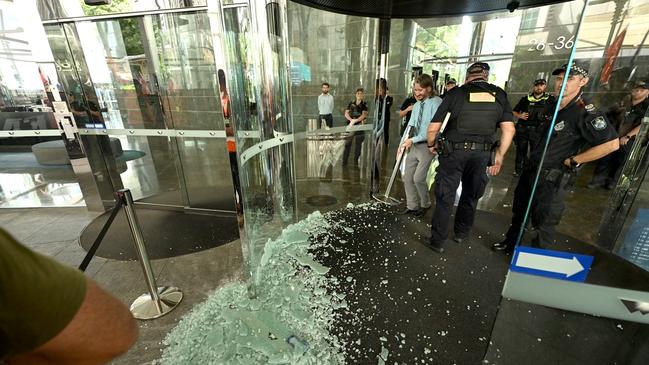
Insiders who were there told The Courier-Mail the actions of the burly CFMEU members was intimidatory and frightening, with a number left emotionally and physically shaken from the encounter having “feared for their safety”.
One insider drew the parallel between the government’s perceived lack of crackdown on the union following the incident and the uproar from the politicians after the “climate grannies” protest inside parliament a few months later.
“They (the politicians) are hypocrites. They carry on when it happens at parliament yet they are allowing physical intimidation, harassment, and bullying across construction sites across Queensland thanks to their aiding and abetting of the CFMEU,” one said.
Weeks before the August storming, the CFMEU were left furious after missing out on securing union coverage over the government’s $2.16bn Coomera Connector project.
Insiders claim union big wigs were left particularly angry with Mr Scales, who reportedly held the line on the union’s demands despite the push from the government on its newly-formed BPIC policy because of fears over whether it delivered value for money.
Three weeks before hitting Mary Street, thousands of CFMEU members swarmed the Tower of Power calling for the sacking of Mr Scales, with Queensland Police forced to close roads as the construction union descended on 1 William Street and were photographed at the doors flanked by cops.
At the time CFMEU boss Michael Ravbar accused the DG and TMR of not complying with the new BPIC policy.
“What is infuriating is that the government has very clear policy directives in this area which are simply being ignored by bureaucrats like TMR director-general Neil Scales,” Mr Ravbar said.
Following the incident at TMR Premier Annastacia Palaszczuk labelled the protest “disgraceful behaviour”.
“That footage is incredibly disturbing and I would have hated being a person there with that happening … they owe an apology to those workers who were subjected to that and who felt unsafe,” she said.
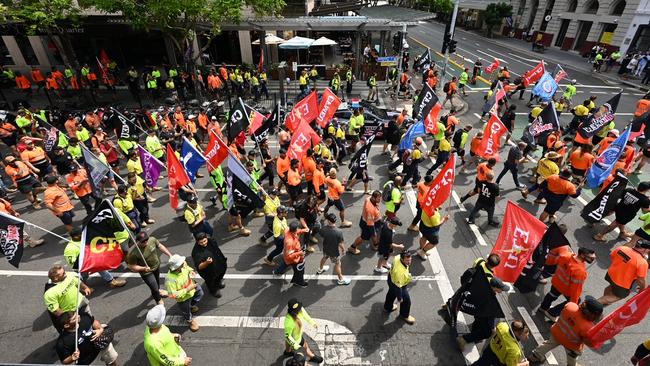
But the Premier faced backlash after she stopped short of returning donations from the CFMEU in the wake of the incident - saying “I’m not the police”, and that it was the party, not her personally, who accepted donations.
Mr Bailey said at the time he would not defend the actions of protesters, but offered little public support to Mr Scales.
The LNP-appointed director-general was the target of a sustained campaign by the CFMEU, which called on him to resign over delays and cost blowouts to major transport projects and the use of the “cheapest cowboy contractors even when not compliant with tendering rules”.
With his contract coming up for renewal, Mr Scales exited his $600,000 job in June - with many within the industry believing it was in part due to the relentless targeting of the union because of his refusal to capitulate to their demands.
“Don’t let the door bang you on the arse on your way out,” a public statement from the CFMEU said after Mr Scales announced his exit.
The state government’s WorkCover, which itself has faced the wrath of the CFMEU for several fatalities and serious injuries on Queensland construction sites, declined to reveal how many claims had been lodged by public servants in the wake of the August 2022 union protest.
HOW CLOSE ARE THEY?
The relationship between the CFMEU and Queensland Workplace Health and Safety inspectors has been a long source of speculation among contractors and subbies.
One case exposed just how intertwined the two had become.
A top WHS director was busted using her personal mobile phone to deal with a complaint from the union, with an investigation by The Office of Industrial Relations finding a CFMEU official had sent five photographs to Helen Burgess in 2021 regarding a complaint about subcontractor Seq Formwork on a site at Spring Hill.
Ms Burgess then sent the images on to the private phone number of an OIR operations manager – with the dealings found to be a “significant and serious departure from standard procedures regarding the management of complaints”.
The Burgess case was loudly prosecuted by Deputy Opposition Leader Jarrod Bleijie, who made a complaint to the Crime and Corruption Commission and prosecuted Director-General Michael De’Ath in last year’s budget estimates.
Incredibly, the details only came to light because Ms Burgess herself launched an appeal to the QIRC against her disciplinary action as a result of the investigation – including a deferment of any consideration of a remuneration increase for six months – which was rejected.
The 2021 incident was not the first time Ms Burgess has been accused of doing the bidding of the CFMEU - and not the first time WHS inspectors have had the finger pointed at them for acting as pawns for the union.
THE COST OF BUSINESS
Queensland could be building three times as many hospital beds if not for this “bullshit” - a senior construction insider believes.
Stakeholders argue the problems - the housing crisis, the taxpayer-funded project blowouts, the slashed productivity - will get worse, as the eye-watering pipeline of projects Queensland has slated for the next five years rockets to a record $107bn - up from the $89bn first touted.
One high-level contractor described a bizarre meeting with CFMEU representatives, questioning “excessive” wages and working conditions they were being urged to agree to which would have significantly blown out the cost estimation and hampered productivity on a major Queensland government project.
“He looked at me and said ‘I don’t know why you’re pushing back so much on this - the government will just fund it’,” he said.
“I was gobsmacked. Like it’s not real money.”
Another said: “the whole industry is exceptionally frustrated, and it’s clear this has been a concerted push from Cabinet”.
“None of them are listening to the concerns of the industry holding their whole pipeline up, as long as their union mates get their cash,” he said.
“We’ve got a government that has stepped into industrial relations in a way we’ve never seen before.
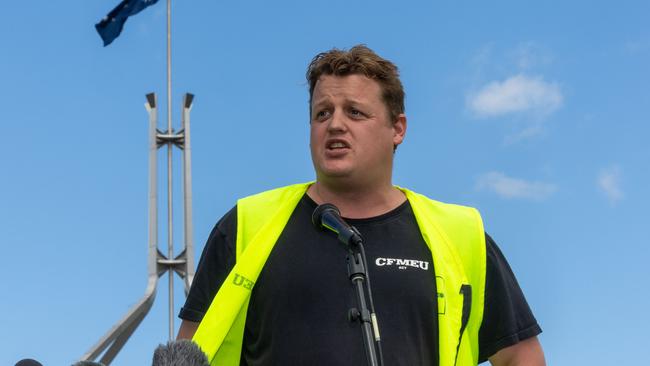
“The CFMEU don’t have control of the civil space and that’s what they want - through BPIC, the government is doing their work for them.”
CFMEU national construction division secretary Zach Smith told the Australian Financial Review earlier this year it was “OK” to break the law sometimes.
“There is a slogan the union uses, you may have heard it - bad laws are made to be broken. That’s something I actually believe in,” he said.
Mr Smith went on to say the union was not “glibly” looking for laws to break for the sake of it, but “where there are laws holding back the ability of workers to organise around safety, where there are laws directly targeted (at) workers capacity to earn better wages and conditions, then I don’t have an issue with those laws being broken”.
It has been years since Queensland attempted a crackdown on militant union tactics.
In 2013, after a devastating nine-week strike at the construction site of the new Queensland Children’s Hospital cost taxpayers $7.4m and led to about 15,000 lost work days, then-Premier Campbell Newman had had enough.
He directed Queensland’s Attorney-General Jarrod Bleijie to introduce a new construction code, which would prevent project delays and cost blowouts “related to union standover tactics and unlawful industrial action”.
Mr Bleijie pledged to save taxpayers between five and 15 per cent on the cost of major public infrastructure projects in Queensland, and said his message to the state’s building and construction unions was simple: “Queensland will not tolerate bullying, intimidation and unlawful industrial action”.
The code outlawed the payment of commission and gratuities to union officials and banned unions from being provided the names of new staff, job applicants or contractors.
Mr Newman said the idea was to “get rampant union bastardry on building sites under control”.
It was one among the first laws to be abolished by Annastacia Palaszczuk’s new Labor government in 2015.
BAD BEHAVIOUR
Some $1.19m in penalties have been slapped on the CFMEU and its union officials for repeated violations of right of entry laws and incidents including blocking a concrete truck, abusive language and making physical contact with a company worker.
On February 1, 2023 Federal Court Justice Berna Collier - while imposing $328,000 in penalties against the union and six current and former officials for defying right of entry laws - noted the CFMEU’s “substantial record of contravening the Fair Work Act”.
Incidents date back as far as 2018, when the six officials entered the Logan and Gateway motorways construction site without a permit and then failed to leave when requested.
In March three CFMEU officials were slapped with $114,000 for hindering and obstructing workers at the Sunshine Coast Bruce Highway upgrade site in 2018 when a truck carrying concrete girders was blocked and prevented from being unloaded.
Penalties imposed against the CFMEU and two organisers for improper conduct at the Boggo Road Cross River Rail site in April 2020 were reduced by the Federal Court in May from $151,200 to $114,000.
The court noted right of entry breaches by two union officials were followed by “offensive” and “insultingly childish” comments.
Two further incidents at the Woolloongabba and Roma Street Cross River Rail construction sites in August 2021 resulted in $225,320 in fines being issued against the union and two officials - including Queensland state secretary Michael Ravbar.
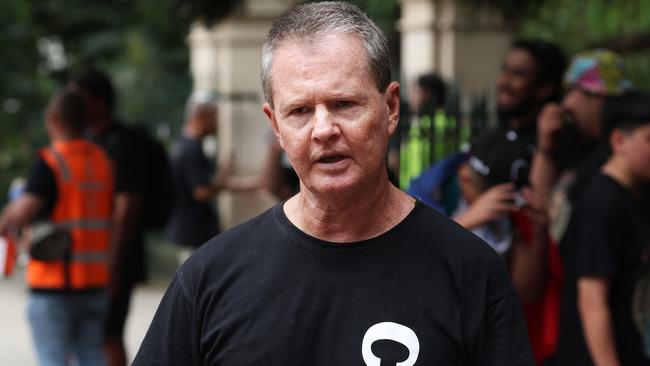
The Federal Court slapped Mr Ravbar with a $9320 fine for entering sites without completing a visitor induction and setting up a barbecue for workers without permission, interrupting work at the site.
In the same case the court found official Andrew Blakeley “made physical contact” with a representative of the site occupier when he entered the Woolloongabba Station site.
Separately, Mr Blakeley was hit with a $14,000 fine in December as part of $171,000 in fines dished out to the union and its officials for breaching right of entry laws in February 2020 at the construction site for the Coles Distribution Facility Project in Redbank.
The union was penalised $150,000 while Mr Blakeley and Luke Gibson were fined $14,000 and $7000 respectively when the pair obstructed a concrete pour by standing in the path of a reversing truck to stop it from discharging its load.
The Federal Court noted Mr Blakeley, and through him the CFMEU, also admitted to breaching the Fair Work Act by misrepresenting to a police officer that he and Mr Gibson had the power to stop works at the facility, when they did not.
Acting Chief Justice Berna Collier said the contraventions were “serious” and declared there was a need to impose a penalty that “must not simply be seen by the (CFMEU) as the cost of doing business”.
Mr Blakeley was before the Federal Court two months earlier when he was penalised $7500 for in November 2020 directing workers at the South Brisbane Central Energy Towers project to stop work and using abusive language towards a site manager.
The union was penalised $50,000 and former CFMEU official Beau Seiffert was slapped with a $4500 fine for being present but failing to attempt to prevent Mr Blakeley’s “improper conduct”.
Justice David Thomas described the conduct as “targeted and deliberate”.
Steven Lovewell has worked as the middle man attempting to broker peace between companies and unions for more than a decade.
He said the demise of the Australian Building and Construction Commission had led to a significant increase in the brazenness of the CFMEU on Queensland building sites.
“The unions are just running rampant and saying well f*ck you we’re coming on site,” he said.
“Their behaviour is becoming more and more aggressive and more brazen.
“There is nothing holding them back and the industry is terrified of the bullying.”
Mr Lovewell said while the union claimed it was improving worker safety, he argued officials had a “great deal of disregard for safety”.
“They breach safety themselves by walking through exclusion zones, they won’t comply with builder’s requests to sign visitors’ books, which is an emergency management plan,” he said.
He said the cost of construction in the state had soared and declared the Olympic-building program could become “totally unviable” if the CFMEU runs those construction sites.
IN ADMINISTRATION
Damning allegations of criminality in the CFMEU’s Victoria and New South Wales divisions this week has prompted the Commonwealth to appoint an administrator.
Prime Minister Anthony Albanese acted when the Queensland government declined and, as part of a national administration, Fair Work Commission general manager Murray Furlong will seek oversight of the CFMEU’s Queensland construction division.
He could be in for a fight, however, with Mr Ravbar refusing to consent to the administration and preparing to wage war against the government.
“Premier Steven Miles should stop listening to Albo’s elf Gary Bullock and ask other union leaders what they think of him running the PM to take out the CFMEU,” Mr Ravbar said.
Mr Miles this week warned the state government would change laws to facilitate the appointment of an administrator - but with parliament not due to return until September any action could drag out.
“The CFMEU has repeatedly stated it will co-operate with any criminal investigation, as we know the real crooks in this industry are the civil contractors and their cronies,” Mr Ravbar said.
It’s a tale with deep history and an increasingly uncertain and hostile future.

Add your comment to this story
To join the conversation, please log in. Don't have an account? Register
Join the conversation, you are commenting as Logout
Brisbane’s No. 1 radio show in chaos – and a star may return
Industry insiders reveal Nova's breakfast throne could lose two of its three hosts within months, threatening the stability of Brisbane's number one breakfast show. WE’VE GOT THE SCOOP
Brisbane ratepayers face Story Bridge cost blowout
Brisbane ratepayers face an extra $1 million bill after the business case for Story Bridge restoration blew out to $6.1 million, prompting Labor to slam decades of LNP neglect.